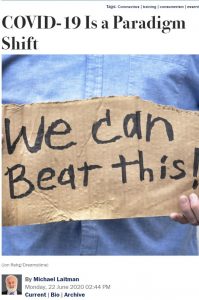
When 2020 began, people’s expectations from America were quite high. Granted, problems were to be expected, but the U.S. and China had just signed Phase One of the agreement to end the trade war between them, unemployment was at an all-time low, and falling, and things were generally looking good for America. But in February, COVID-19 happened and everything toppled down. America went into lockdown, and in a matter of weeks, the country has sunk into turmoil. Now, only a new vision of reality can save the tormented country.
As soon as people came out of lockdown, they started going wild.They started partying, going to bars, protesting, rioting, looting, and they would not be stopped. But the coronavirus doesn’t take anything or anyone into consideration. People can party all they want but the virus will do what the virus does: infect people with COVID-19. It will not let anyone, in any country, return to the way of life we ran before March 2020. Or, as medical reporter Michelle Cortez wrote on Bloomberg after stating that no vaccine is in sight for this year, and probably not next year either, “It’s time to reset our expectations and change our behavior.”
But it is more than a change in our behavior. It is a paradigm shift. All non-essential businesses will not be able to continue operating in the short to medium term. Essential businesses will thrive, but they will provide work to less than half of the workforce, and the majority of people will be permanently jobless.
But jobless people have to eat, as well. Already, one in six Americans are often hungry. According to Bloomberg reporters Catarina Saraiva and Dave Merrill, the number of people who often go to bed on an empty stomach was nearly 40 million in 2019. Now with the coronavirus it has soared and it is soaring still. By the end of 2020, the number of people suffering from food insecurity will be “54 million, including 18 million children.” This is a number that cannot be ignored; it is a fast-ticking time bomb.
To “deactivate” the bomb, the federal government, states, and municipal authorities will have to establish two mechanisms that together will foster a sustainable and cohesive society.
The first mechanism is provision of basic sustenance to everyone according to agreed upon criteria. This mechanism will not only meet people’s nutritional needs; it will also guarantee that they get decent living conditions, healthcare, education, and power (electricity and gas). The second mechanism will be a network of online and offline courses and trainings that will be given to every person who is unemployed. In fact, even people who are employed will partake in periodical “training duties,” much like today’s jury duties. These trainings will offer both information on the social and economic conditions that the coronavirus requires that we adapt, as well as group exercises to learn how to build our relationships and day-to-day lives according to the new conditions.
By a gross exaggeration, it can be said that when people are idle and without commitments, they can become prone to disorderly conduct. For this reason, it is paramount that reception of government benefits will be contingent upon participation in the trainings.
To incentivize participants, they will not be labeled as unemployed or jobless, but rather as makers, creators, or producers. The trainings will teach them to create a commodity that doesn’t exist today, but which will be the most needed: solidarity. These people will be the makers, vendors, salespersons, and absorption instructors for the new commodity.
Precisely because of America’s businesslike mentality, it has the greatest potential in making a successful shift from material consumerism to social consumerism, where people become “hooked” on bonding. In a climate of diminishing competition from the material world due to shutting down of businesses, the paradigm shift will be far easier and quicker than we can currently envision.
As long as the two just mentioned conditions are met, and people meet their physical needs by committing to trainings in socializing, the road to America’s emergence from its crises is paved.
At the moment, it may be hard to see how the nation can bridge the chasms in American society, but when people realize there is no other choice, they will play ball. And when they do, they will see that bonding really is like playing ball: It’s all about teamwork.